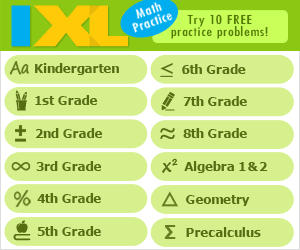SAT/ACT Vocabulary List for 08/02/2010
Here is today's word list:
- abstain (v.): To keep oneself back (from doing or using something).
- advocate (n.): One who pleads the cause of another, as in a legal or ecclesiastical court.
- amply (adv.): Sufficiently.
- approbation (n.): Sanction.;
- authenticity (n.): The state or quality of being genuine, or of the origin and authorship claimed.
- bibliophile (n.): One who loves books.
- bustle (v.): To hurry.
- choral (adj.): Pertaining to, intended for, or performed by a chorus or choir.
- compress (v.): To press together or into smaller space.
- contaminate (v.): To pollute.
- cranium (n.): The skull of an animal, especially that part enclosing the brain.;
- deform (v.): To disfigure.
- detest (v.): To dislike or hate with intensity.
- dispensation (n.): That which is bestowed on or appointed to one from a higher power.
- duet (n.): A composition for two voices or instruments.
- encomium (n.): A formal or discriminating expression of praise.
- evasion (n.): Escape.
- extravagant (adj.): Needlessly free or lavish in expenditure.
- foolery (n.): Folly.
- galvanism (n.): Current electricity, especially that arising from chemical action.;
- habitual (adj.): According to usual practice.
- hypothesis (n.): A proposition taken for granted as a premise from which to reach a conclusion.;
- improvise (v.): To do anything extemporaneously or offhand.
- inevitable (adj.): Unavoidable.
- insurrection (n.): The state of being in active resistance to authority.
- irrational (adj.): Not possessed of reasoning powers or understanding.
- laud (v.): To praise in words or song.
- loot (v.): To plunder.
- matter of fact (n.): Something that has actual and undeniable existence or reality.
- misogamy (n.): Hatred of marriage.
- nausea (n.): An affection of the stomach producing dizziness and usually an impulse to vomit
- obligatory (adj.): Binding in law or conscience.
- orthopedic (adj.): Relating to the correcting or preventing of deformity
- parlance (n.): Mode of speech.
- permanence (n.): A continuance in the same state, or without any change that destroys the essential form or nature.
- platitude (n.): A written or spoken statement that is flat, dull, or commonplace.
- preemption (n.): The right or act of purchasing before others.
- prolix (adj.): Verbose.
- quarto (n.): An eight-page newspaper of any size.
- referee (n.): An umpire.
- resemblance (n.): Similarity in quality or form.
- sapid (adj.): Affecting the sense of taste.
- shrewd (adj.): Characterized by skill at understanding and profiting by circumstances.
- statecraft (n.): The art of conducting state affairs.
- supplicate (v.): To beg.
- theological (adj.): Based on or growing out of divine revelation.;
- triple (adj.): Threefold.
- urgency (n.): The pressure of necessity.
- vitalize (v.): To endow with life or energy.
How To Master These Words
- Create or buy a notebook. It can be named SAT/ACT Vocabulary Notebook or you can create your own name. You will be keeping your weekly words, definitions and assignments in this notebook.
- Write the words and definitions in your vocabulary notebook.
- Create your own sentence using each word and write this in your vocabulary notebook.
- Make Flashcards - Write the word on one side of an index card and put the definition and a sentence on the opposite side. You can find ideas for making flashcards on the Internet by clicking on the link: Resources showing how to create your own flashcards.
- Online Flashcard Game: Go to this site. lingro.com. Click on "wordlist" at the top of the page. Then click on "create new wordlist." Enter your word list for the week. When finished, click on "games" at the top of the page. Then click on "flashcards" and select your list. See if you can name the definition on each word before clicking on it to see the answer.
- Use this dictionary link to check the pronounciation of each word. Type each word in the box on the left, then click the sound icon to listen.
- Use TokBox to practice saying the words aloud. Register to get a free account. Click on "Send a Video Message." A box will open to set up your computer microphone and camera. Click "allow". Press the red "Record" button to begin. Press the "Stop" button when you are finished. Once you have practiced saying the words and recording it, send the video you created to your email account and listen to your video message. Send it to your parents' email account also to show them what you are learning.
- Create your own crossword puzzle. Click on this link. Enter your words and your clues (definition), then click "Create Crossword Now." A new web page will appear. You can put a title on your puzzle if you wish, then click "Create Crossword." Print this out and complete the puzzle. Insert the completed work in your vocabulary notebook.
Search Internet4Classrooms

Custom Search






